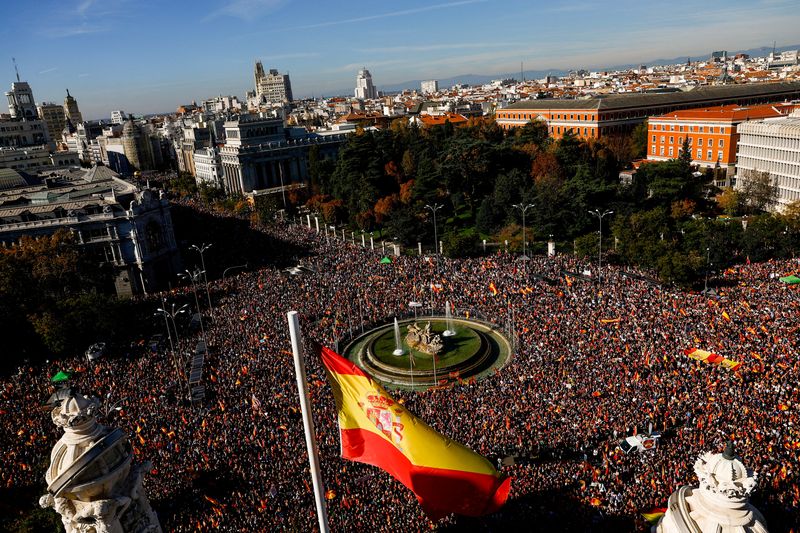By Joan Faus
BARCELONA (Reuters) – Tens of thousands of people took to the streets across Spain in recent weeks to protest against the pledge of an amnesty for Catalan separatists in return for their votes for a new socialist government.
But in the Catalan capital Barcelona, street graffiti and placards about the war in Gaza have been much more ubiquitous in than any new referencing of the amnesty or independence.
The region’s separatist parties see the amnesty as a foot in the door to press further their goals for self-determination – and have warned newly elected Prime Minister Pedro Sanchez their ongoing support for his government will depend on progress.
However in Catalonia, polls show that while approval for the amnesty and even a referendum on independence is high, appetite for separation itself has fallen.
“Momentum has waned a lot,” said Anais Nadal, a 44-year-old hairdresser in Barcelona who supports independence.
Attendance at separatist marches has nosedived, she said.
“People have gotten tired because nothing has been achieved and it will be very hard to recover the level of support there was”, she said. “I support the amnesty law, I think it can help but being realistic I doubt we will achieve much more”.
There is also mistrust of the movement’s leaders after the unfulfilled promises made during the last independence drive in 2017, which brought on one of the most serious crises in Spanish politics since the return to democracy.
That push culminated in a unilateral declaration of independence which led to Madrid imposing direct rule on Catalonia and the arrest and jailing of separatist leaders.
“Many separatists have felt deceived by their politicians who made them believe that independence was just around the corner,” said Catalan columnist Jordi Barbeta.
“So it seems difficult to recover that enthusiasm and level of mobilization now, but this does not mean people are not pro-independence”.
‘TURNING THE PAGE’
In an impassioned congressional speech last Wednesday answering detractors who accused him of trading Spanish unity for votes, Sanchez presented the amnesty deal as a means to turn the page on Catalonia’s independence ambitions.
“We have opted for reunion over revenge, unity over fracture,” he told lawmakers, prompting raised eyebrows among separatist parties.
Since assuming office in 2018, Sanchez has taken a softer approach to Catalonia than his conservative predecessor, pardoning nine jailed independence leaders and annulling the crime of sedition under which they were sentenced.
His efforts bore fruit. Hardline separatist party Junts and its more moderate rival, ERC, lost 550,000 votes combined in the national election in July compared to 2019, and a third of their 21 seats, while the Socialists gained 418,000 votes in Catalonia.
Sanchez’s socialist PSOE now believes the amnesty will help it gain votes and potentially even wrest control of Catalonia’s regional government from the ERC in a 2025 regional election, a government source said.
Junts and ERC, meanwhile, hope to use their leverage in the national parliament to lure back voters.
Junts congressional leader Miriam Nogueras told Sanchez last week her party still considered itself bound by the 2017 independence referendum that Madrid ruled illegal.
“For us, the commitment to independence is unrenouncable. If anyone says that this agreement serves to turn the page, they are deceiving their citizens,” she said.
But separatist parties face a challenge to mobilise voters for a fresh independence drive as they are deeply divided among themselves and engulfed in infighting, a stark contrast with the unity behind the 2017 push.
Josep Rius, vice-president of Junts and a close friend of its leader Carles Puigdemont, who remains in self-exile in Brussels because of charges he faces over the 2017 drive, said they take Sanchez’s willingness to grant an amnesty he once refused as a sign further concessions might be possible including to a binding independence referendum.
“The agreement signals a change of paradigm and gives a new push (to the independence cause)” he said. “As if it was a transatlantic ship, the PSOE has started shifting its position,” he added.
Separatists argue that there are loopholes and interpretations of the Spanish constitution that would allow a referendum to go ahead should the Madrid government want it to.
A Catalan socialist party source said it was “good news” Junts had agreed to step away from unilateral action, but that there would be no independence referendum.
‘REGROUPING’
The largest protests against the amnesty have taken place in Madrid and other cities, with just a handful of smaller events in Barcelona.
Though apathy may currently dominate feelings about independence, the region’s relationship with Madrid remains a hot button issue as it has for decades.
A survey released by the Catalan government-run Centre for Opinion Studies found the region’s residents rated its relationship with Spain as their primary concern, followed by the economy.
Sixty percent of respondents backed the amnesty, which is estimated to benefit several hundreds of separatists, while 41% want Catalonia to leave Spain, from a high of 49% in 2017.
Support though for a referendum remains high, at 73%, signalling that a majority wants to decide on the issue of independence even if it is to vote no.
Catalan political scientist Toni Rodon said support for independence could nudge upwards still if separatist parties could agree a joint approach or initiatives to devolve more powers to Spanish regions slowed.
Raul Romeva, an ERC politician who was Catalonia’s foreign affairs chief in 2017, acknowledged the separatist movement would now have to refresh tactics and regroup, but should feel emboldened by its deal with Madrid.
“The path is not easy, quick or pain-free, but there is no question we will end up voting (in a referendum),” he said.
(Reporting by Joan Faus, additional reporting by Belen Carreno, editing by Aislinn Laing and Angus MacSwan)
